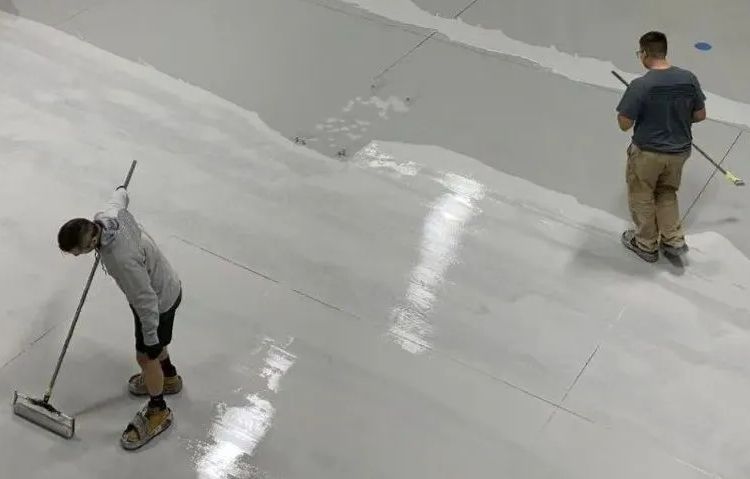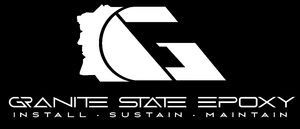Epoxy Flooring for Cold Storage Facilities
Essential Features & Applications for Temperature-Controlled Environments
Cold storage facilities in Manchester, NH, face distinct challenges that demand tailored flooring solutions built to handle extreme conditions and heavy use. From food distribution centers near Manchester-Boston Regional Airport to pharmaceutical storage facilities across the city, these facilities require floors that can withstand extreme temperatures, heavy machinery and constant moisture exposure.
Industrial-grade epoxy flooring delivers the perfect combination of strength, thermal resistance, and safety—making it a smart choice for cold storage environments. These high-performance systems remain structurally sound even in sub-zero temperatures as low as -40°F, all while withstanding the constant pressure of forklifts, pallet jacks and heavy inventory.
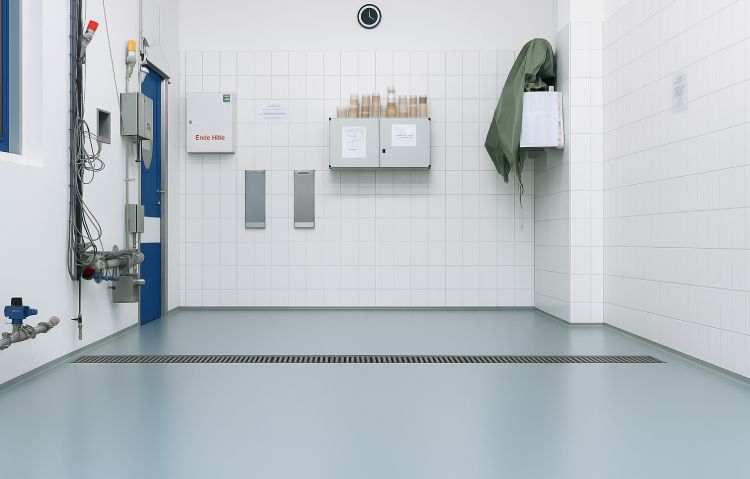
Thanks to their seamless, non-porous finish, epoxy floors effectively block moisture and help prevent bacteria from spreading—an essential advantage for hygiene-sensitive operations.
Our experience installing epoxy floors in Manchester's cold storage facilities has shown that proper flooring is crucial for operational efficiency and safety compliance. The specialized coatings create slip-resistant surfaces that protect workers in icy conditions, while meeting strict USDA and NSF standards for food safety and hygiene.
Why Epoxy Flooring Is Essential for Cold Storage Facilities in Manchester, NH
Cold storage facilities in Manchester deal with unique challenges—from shifting regional temperatures to the constant flow of activity near Manchester-Boston Regional Airport. Epoxy flooring provides dependable protection against these demanding conditions, helping operations remain efficient and in line with industry regulations.
Critical Flooring Challenges in Cold Storage Environments
Moisture control is a major challenge for cold storage facilities in Manchester, where fluctuating temperatures often cause condensation and frost to form. Without proper protection, concrete floors can crack, weaken and deteriorate under these harsh conditions.
Heavy machinery, like forklifts and pallet jacks, is constantly in motion, while routine washdowns add to the wear and tear. Over time, traditional flooring materials break down—especially at joints and seams—creating ideal conditions for bacterial growth.
Many conventional floors simply can’t keep up with the region’s strict health and safety standards. This often leads to unexpected repairs, sanitation risks and potential compliance issues that can impact operations and profitability.
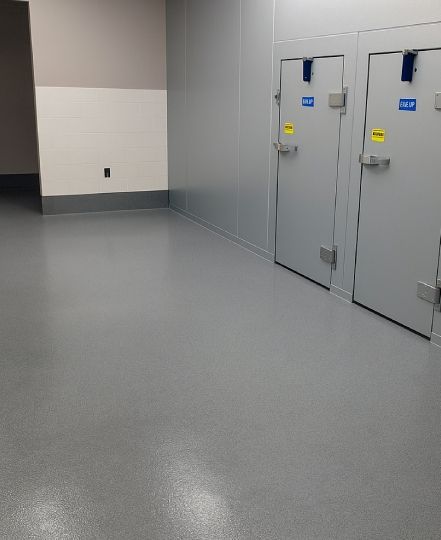
Superior Performance of Industrial Epoxy Flooring
Industrial epoxy flooring creates a smooth, seamless surface that blocks moisture and keeps bacteria from gaining a foothold. Its non-porous design makes both routine cleaning and deep sanitation faster and more effective—ideal for environments where hygiene is non-negotiable.
To improve safety, these floors can be customized with anti-slip additives that provide steady traction, even in wet or icy conditions—a crucial benefit for employees working in Manchester’s cold storage facilities.
On top of that, epoxy’s strong resistance to chemicals means it can handle harsh cleaners, de-icing agents and food-safe sanitizers without breaking down. This makes it a reliable long-term solution for high-demand refrigerated spaces.
Durability and Thermal Resistance in Subzero Conditions
Our industrial epoxy flooring holds up reliably even at temperatures as low as -40°F—making it a dependable choice for Manchester’s frozen storage environments.
The thermal shock resistance prevents cracking when exposed to dramatic temperature changes between storage zones and loading areas.
Key Performance Features
- Withstands heavy forklift traffic
- Resists impact from dropped items
- Maintains bond strength in freezing conditions
- Prevents thermal expansion damage
Key Features and Specialized Applications of Epoxy Flooring for Cold Storage
Industrial epoxy floor coatings deliver the high-performance protection cold storage facilities need to operate efficiently and safely. Designed for demanding environments, these systems combine exceptional durability, slip resistance and regulatory compliance into one seamless, long-lasting solution.
Slip Resistance and Workplace Safety
Textured epoxy coatings create dependable non-slip surfaces that prevent accidents in cold, wet conditions. We incorporate specialized aggregates and additives to achieve coefficient of friction ratings that exceed OSHA standards.
The surface texture remains effective even when exposed to frost, condensation, or cleaning solutions. This provides stable footing for workers and equipment operators.
Safety markings and line striping can be seamlessly integrated into the epoxy system to designate traffic lanes, storage zones and hazard areas.
Hygiene and Food Safety Compliance
Seamless food-grade epoxy flooring solutions eliminate joints and crevices where bacteria could grow. The non-porous nature prevents moisture absorption and contamination.
Key Compliance Features
- USDA/FDA approved formulations
- Antimicrobial additives
- Easy sanitization
- Chemical resistance to cleaning agents
Regular cleaning and disinfection protocols can be performed without degrading the epoxy coating. The surface maintains its integrity even with frequent exposure to harsh sanitizers.
Epoxy Systems for Freezer Rooms and Refrigerated Warehouses
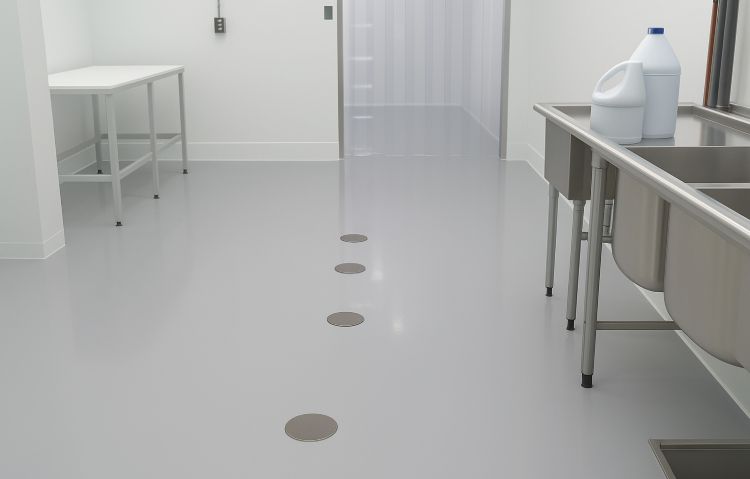
Different areas within a cold storage facility often need tailored epoxy flooring solutions, depending on their temperature range and how the space is used. From deep freezers to refrigerated loading docks, each zone comes with its own challenges—so choosing the right formulation ensures the floor performs reliably under those specific conditions.
Temperature-Specific Applications
- Walk-in freezers (-20°F to 0°F)
- Blast freezers (down to -40°F)
- Refrigerated storage (32°F to 45°F)
Heavy-duty epoxy mortars offer added thickness and reinforced strength, making them ideal for environments exposed to intense temperature swings or constant heavy traffic. These systems are built to withstand mechanical stress and thermal cycling without cracking, peeling or wearing down—delivering long-term performance where standard coatings fall short.
Proper Surface Preparation and Installation Considerations
A successful epoxy installation in cold storage starts with meticulous surface preparation. The concrete substrate must be properly cleaned, dried and mechanically profiled to create the ideal texture for maximum coating adhesion and long-term performance.
Moisture testing and vapor barrier assessment are essential steps before installation. Cold storage facilities often require specialized moisture mitigation systems.
Timing is critical when installing epoxy flooring in active cold storage facilities. To minimize disruptions, we carefully coordinate the application and curing process around your operational schedule—ensuring the system performs as intended without compromising productivity.
Frequently Asked Questions
Expert-grade epoxy flooring systems protect cold storage facilities through specific thermal, safety and durability features. These solutions address crucial operational requirements while meeting strict industry standards.
Can epoxy flooring systems be installed at subzero temperatures, and if so, how low can they go?
Absolutely. Some epoxy flooring systems are specially formulated to handle extreme cold. These cold-weather epoxies can be applied and cured at temperatures as low as -40°F. When installed with proper surface preparation and the right techniques, they still bond tightly to concrete and deliver the same durability and longevity you'd expect under normal conditions. The key lies in choosing the right product for the temperature and ensuring meticulous prep—even in freezing environments.
In what ways do USDA and NSF certifications contribute to the suitability of epoxy flooring for food-related cold storage?
USDA and NSF-certified epoxy flooring is specifically designed for food-related environments, meeting the highest standards for cleanliness and safety. These certifications confirm the flooring won’t trap bacteria or contaminate stored goods—an essential requirement for cold storage handling perishable items. The smooth, non-porous surface resists organic buildup and makes deep cleaning far more effective. By choosing certified epoxy systems, facilities stay compliant while maintaining a hygienic, food-safe operation.
What are the key considerations when choosing an epoxy coating for refrigerated warehouses?
Selecting the right epoxy system involves evaluating the facility’s temperature range, thermal cycling and traffic demands. Coating thickness, reinforcement options and slip resistance must align with daily operations. Cure times and installation conditions are also critical—especially for active facilities needing minimal disruption. A well-matched epoxy system balances performance, durability and installation logistics for optimal long-term results in refrigerated environments.
How does epoxy flooring compare to other flooring options for cold storage applications in terms of durability and maintenance?
Epoxy flooring outlasts tile and bare concrete in cold storage settings, offering superior protection with far less upkeep. Its seamless, joint-free surface eliminates places where dirt, moisture and bacteria typically build up, making it easier to clean and sanitize. When installed properly, epoxy systems rarely need repairs and can perform reliably for 10 to 15 years. For routine upkeep strategies, check out our
epoxy floor maintenance for cold environments.
Let's Talk About Your Frozen Floors
Whether you're expanding your walk-in freezer space or retrofitting a 100,000 sq. ft. cold storage warehouse, the right epoxy flooring solution sets the tone for performance, safety and compliance.
Ready to Upgrade Your Cold Storage Floors?
Request a Free Consultation Today — and discover how our epoxy systems outperform under pressure.
